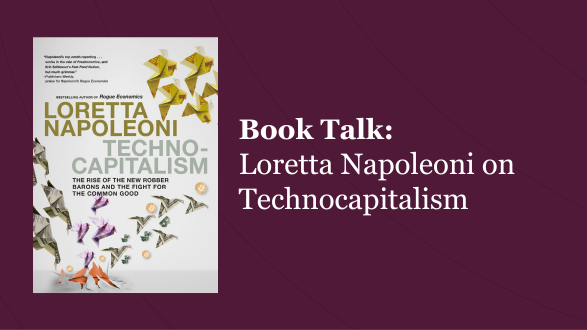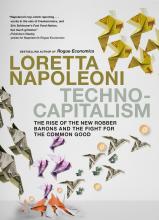Zoom Webinar
Join the Pacific Council for a webinar examining Loretta Napoleoni’s new book TECHNOCAPITALISM: The Rise of the New Robber Barons and the Fight for the Common Good.
At the dawn of the digital revolution, the internet was going to be the great equalizer, a global democratic force. Instead, with the money printed electronically to bail out banks, Wall Street funded a new breed of serial capitalists, the Techtitans, who embraced rapid, transformational change while stripping their workers of rights and enriching themselves beyond anybody’s wildest imagination – some went on to became the Space Barons, who mine new frontiers for precious resources: our data. Then came the gig-economy, another supposed digital equalizer, where everybody was his or her own boss, but it was just another illusion.
“Tech pioneers like Google, Facebook, Apple, Uber, and Microsoft never had any intention of spreading democracy, they are the modern Robber Barons” argues economist, international bestselling author and investigative journalist, Loretta Napoleoni in TECHNOCAPITALISM: The Rise of the New Robber Barons and the Fight for the Common Good (Seven Stories Press, April 16, 2024).
“Those who control and own the technology are the absolute masters. As artificial intelligence enters the labor market, companies like Uber are able to cut labor costs to the barest of minimums, by squeezing workers’ privileges and rights.”
Napoleoni describes these phenomena as the genesis of a new paradigm, born in a period of extraordinary change in which the acceleration of transformational change causes a dizzying, anxiety-induced paralysis: from the FTX collapse to AI, from private space companies to the war in Ukraine, from inflation to the dirty environmental truth of EV car batteries, we live in a world of shifting sands.
Guest Speaker
Loretta Napoleoni is a Fulbright scholar at Johns Hopkins University and the London School of Economics. In the early 1980s she began her professional career as an economist in Hungary, Russia and the city of London. In the mid-90s, when she was one of the people chosen by the Red Brigades to relate their story, she began analyzing terrorism collecting information, data and interviewing several armed groups.
In 2003 she published Terror Incorporated, the first comprehensive book on the financing of terrorism, and she began consulting governments and international organizations on this topic. Among her many achievements, Napoleoni served as Chairman of the countering terrorism financing group of the Club de Madrid, lectured at the Judge Business School in Cambridge on business ethics, was a TED and TEDx speaker, and sat on the board of the Journalism Fund Europe for financing investigative and independent journalism.
Napoleoni is an international speaker and a contributor to several newspapers including El Pais, La Repubblica, and the Chicago Tribune. She is also a commentator for BBC, Sky, CNN and many other media outlets. She is the author of several international bestsellers including Rogue Economics, Maonomics, and Terror Nation. Her books have been translated into twenty-one languages.
Presider
Martin Rauchbauer is the Co-Founder of the Tech Diplomacy Network, a platform for practitioners representing governments, civil society, and global tech companies to tackle planetary challenges with frontier technologies. Previously, he served as Austria's first Tech Ambassador in Silicon Valley, where he shaped the emerging field of tech diplomacy, engaged in transatlantic digital diplomacy and digital human rights, and developed digital humanism as a strategic focus of Austrian foreign policy. He has a passion for bridging the gap between diplomacy, arts, technology, and the environment, and has published and lectured on these topics. Currently he also serves as the Executive Director of the Djerassi Resident Artists Program, one of the world's artist residencies.
Book Description
TECHNOCAPITALISM addresses these issues and delves into advances that took place to reach this point, how they were used or misused and what can be done to take control back. Issues covered, include:
- OpenAI and its ChatGPT demonstrate both the promise and risks of artificial intelligence. Their founders promote philanthropic goals but the technology could also lead to oppression if not at the service of the common good.
- The metaverse aims to create immersive virtual worlds and economies. NFTs and crypto may enable new business models. But risks include increased isolation and escapism.
- The digitization of money has reduced government control. Cryptocurrencies allow people to bypass the state as the issuer of money. Crypto currencies like Bitcoin are a threat to state monetary monopoly.
- The rise of the tech industry dramatically increased economic inequality rather than encouraging equitable wealth distribution. The greed and ethos of Wall Street cross-pollinated with Silicon Valley.
- By taking over functions once carried out by nation states like postal systems, mapping, and currencies, tech giants are eroding state sovereignty and centralized power.
- The War on Terror and the Russia-Ukraine war both contribute greatly to greenhouse gas emissions, however, their climate impacts are ignored for political reasons.
- Space represents a new commercial frontier, but unchecked capitalism and national rivalries threaten its potential for benefiting humanity as a whole. A more enlightened approach is essential to avoid space becoming another arena for earthly conflict.
Technological innovation can help achieve sustainability, it can address the dangers of imbalance between resource supply and demand. TECHNOCAPITALISM details that to achieve such goals, consumers must understand, control and direct technology collectively, towards the common good. The people must take back control of technology from those currently monopolizing it.
“The economic model of infinite growth threatens human survival, and we need to evolve our thinking, embrace space, and take control of our future,” concludes Napoleoni.







